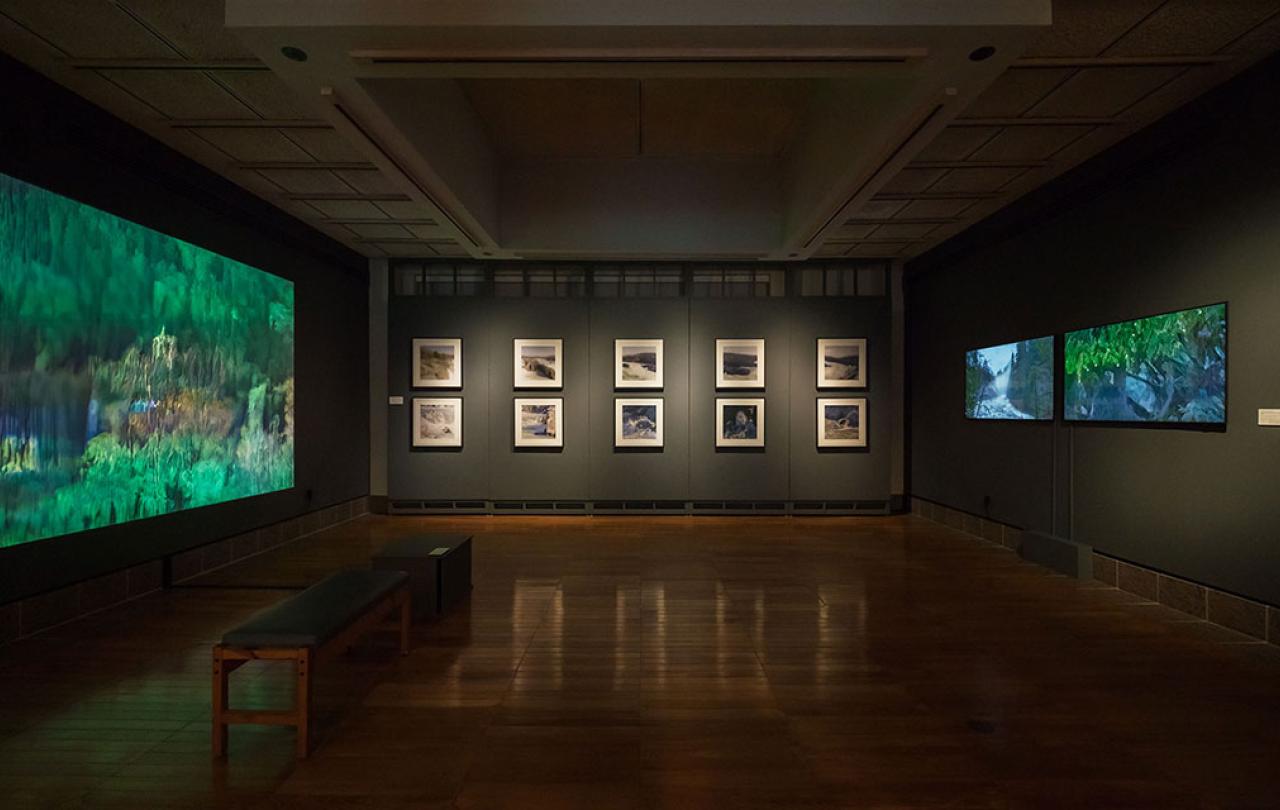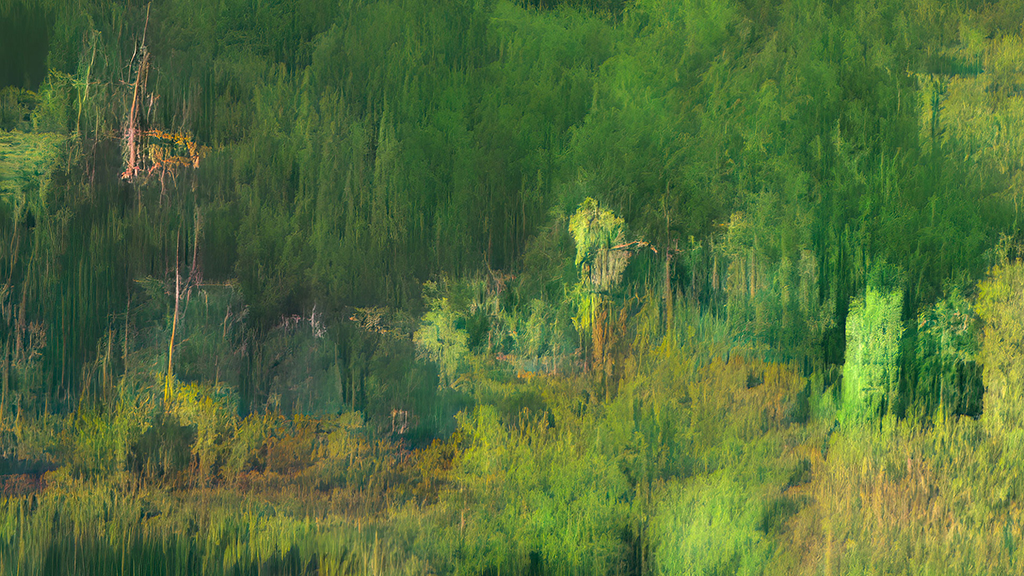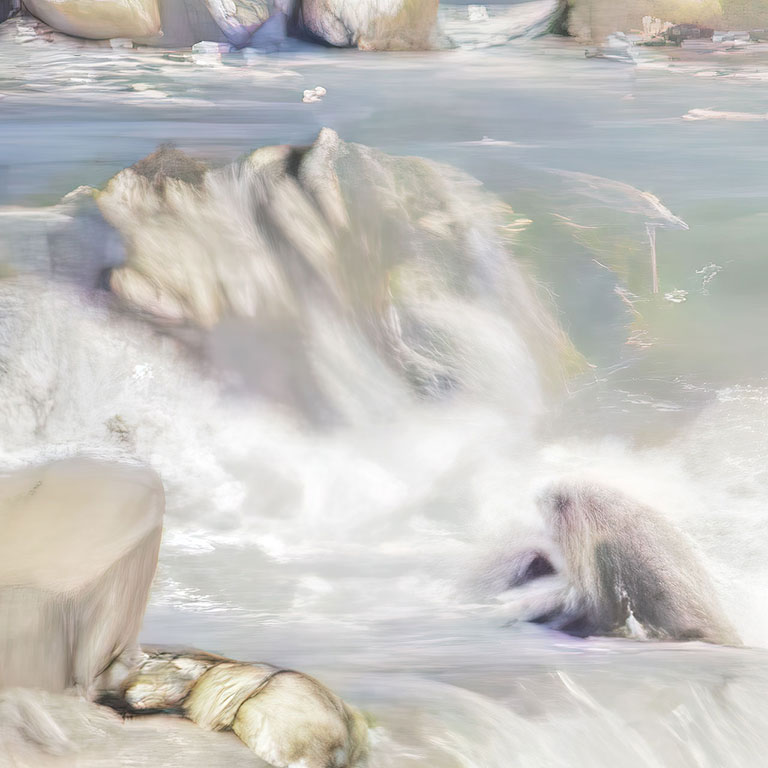
In the current fractured debate about the future development of Artificial Intelligence (AI) systems, artists are among those informing our understanding of the issues through their creative use of technologies. British-American visual artist Michael Takeo Magruder is one such, with his current exhibition Un/familiar Terrain{s} infusing leading-edge AI systems with traditional artistic practices to reimagine the world anew. In so doing, this exhibition pushes visitors to question the organic nature of their own memories and the unsettling notions of automatic processing, misattribution, and reconstruction.
The exhibition uses personal footage of specific places of renowned natural beauty that has been captured on first generation AI-enabled smartphones. Every single frame of the source material has then been revised, reworked, and rebuilt into digital prints and algorithmic videos which recast these captured moments as uncanny encounters. In this exhibition at Washington DC’s Henry Luce III Center for the Arts & Religion, the invisible work of the AI allows people to experience more than there ever was, expanding both time and space.
Magruder has been using Information Age technologies and systems to examine our networked, media-rich world for over 25 years. A residency in the Department of Theology and Religious Studies at King’s College London resulted in De/coding the Apocalypse, an exhibition exploring contemporary creative visions inspired by and based on the Book of Revelation. Imaginary Cities explored the British Library’s digital collection of historic urban maps to create provocative fictional cityscapes for the Information Age.


JE: You are a visual artist who works with emerging media including real-time data, digital archives, VR environments, mobile devices, and AI processes. What is it about the possibilities and challenges of emerging media that captures your artistic imagination?
MTM: As a first-generation digital native, computer technologies – and the evolving range of potentials they offer – have deeply informed my life and art. Computational media not only opens different avenues for artistic expression but provides a novel means to recontextualise traditional artforms and histories of practice; its ephemeral nature is a particular draw. However, this also creates new challenges, especially in areas concerning preservation and access. I sometimes wonder if my art will still exist for future generations to experience in full, or if it will simply fade alongside the technologies that I’ve used in its production.
JE: To what extent does Un/familiar Terrain{s} build on past exhibitions like Imaginary Landscapes and Imaginary Cities, and to what extent does it break new ground for you?
MTM: Un/familiar Terrain{s} certainly arises from and expands on the artistic concepts of those past projects. The main difference is that each artwork in Un/familiar Terrain{s} is generated from a small sample of personal data (a scenic moment that I’ve captured intentionally), not digital materials gleaned from large public archives and online collections.
JE: Do you find that working with images of the natural world (as is the case with this exhibition) as opposed to images of human-made environments (as you did with 'Imaginary Cities') leads to different approaches or inspiration on your part?
MTM: My projects that explore constructed environments often reference principles of Modernist architecture and design whereas my pieces in Un/familiar Terrain{s} explicitly seek to dialogue with the long history of Western landscape art. The AI systems that I have used in their creation are leading edge but conversely, their conceptual references extend back to long before the onset of what we consider ‘modern’ art.
JE: I've heard many artists criticise digital art in terms of degrading the principal tools and techniques of artists throughout history and those arguments would be made even more vigorously in relation to AI. In this exhibition you're enabling a conversation about the painterly effects you can create as a digital artist and those that can be achieved through AI, yet without leading us to one side or other of that argument. Is your vision essentially one of wanting to see the possibilities in whatever tools, techniques or technologies we have to hand?
MTM: Absolutely. For me that’s one of the fundamental purposes of art. AI is unquestionably the most disruptive (and potentially problematic) technology affecting creative communities at present, but it’s just the most recent historical example. I imagine similar criticisms arose during the proliferation of devices like the printing press and the first photographic cameras. Such inventions clearly did not ‘degrade’ art, but they indisputably shifted its trajectory.
JE: While your work is not expressly religious, you have engaged with theological themes and institutions as with Un/familiar Terrain{s}, which is on show at Wesley Theological Seminary in Washington DC. What do you think it is about your work and the ways you use and explore emerging media that enables such a dialogue to take place?
MTM: I feel that many of the social and ethical questions raised by the emergence of transformative digital technologies are quite similar (and sometimes identical) to ones that have been traditionally posed by theologians. With that in mind, although the fields are quite different in many ways, at present there are some strange and compelling intersections.
JE: From your experience, what can theological or religious institutions learn from a more engaged involvement with emerging media, particularly AI?
MTM: Like artists, perhaps theologians can use emerging (and disruptive) media to not only expand possibilities for their work, but more importantly, to refocus their efforts towards areas that these technologies cannot presently (and will likely never) address.
JE: Apocalyptic scenarios are often invoked in response to developments such as AI, the refugee crisis, populist political movements or the climate emergency. In De/coding the Apocalypse, you worked with emerging media to explore contemporary creative visions inspired by and based on the Book of Revelation. From that experience, what advice would you give to emerging artists wanting to engage with or invoke apocalyptic imagery? How might emerging artists live in the shadow of apocalypse or what have you noticed about our contemporary fear of modern apocalypses?
MTM: Throughout history, visions of apocalypse have been consistently rooted in humanity’s prevailing fears. In the Digital Age these sit alongside our growing concerns about technologies that afford increasingly greater potential to create or destroy. Of course, artists should continue to reveal the deeply problematic (and potentially apocalyptic) aspects of new technologies, but they should also highlight their positive aspects to encourage the creation of “a new heaven and a new earth” that can be a better place for all.
Un/familiar Terrain{s}, 30 May – 18 September 2024, The Dadian Gallery, Henry Luce III Center for the Arts & Religion.





